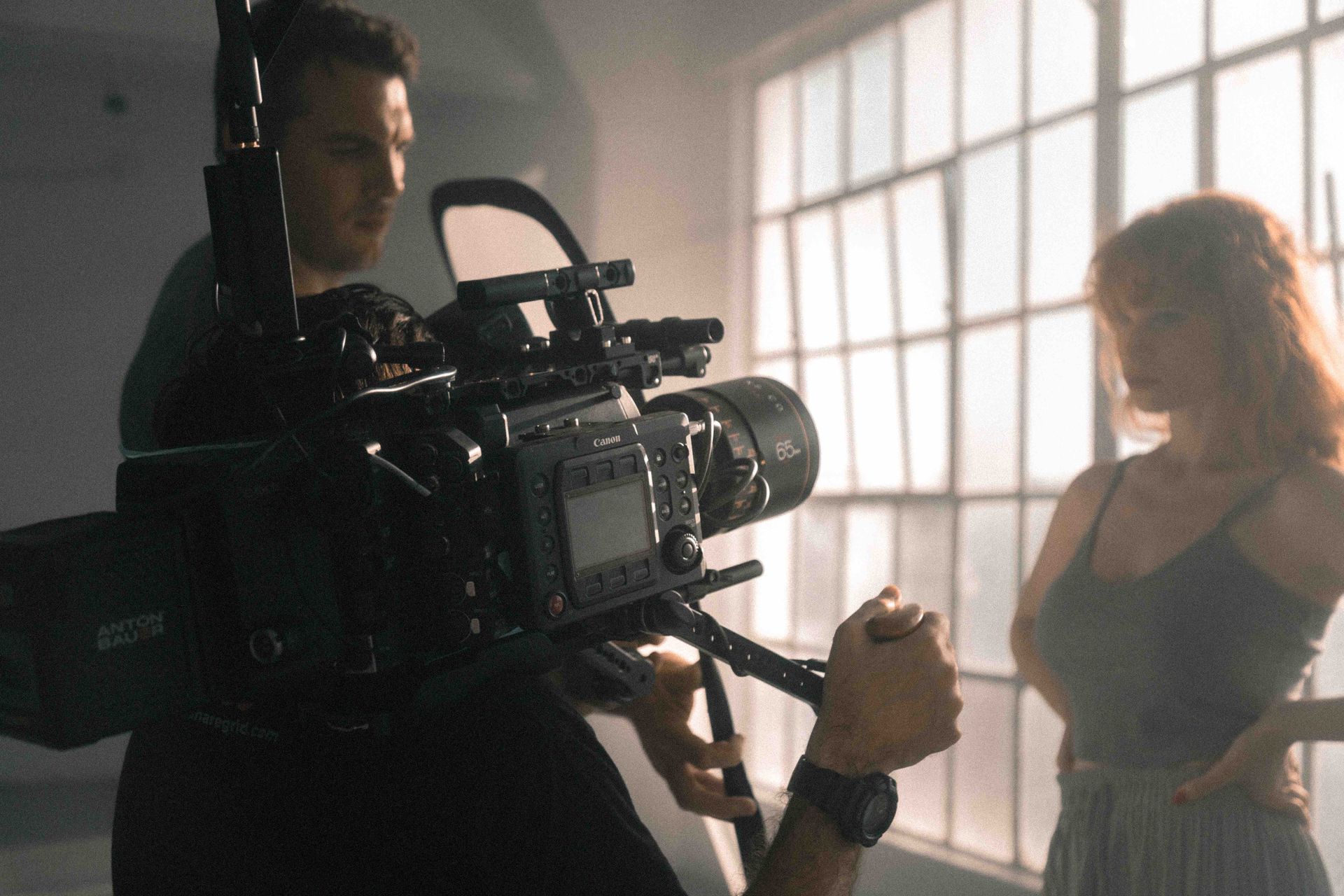Sylvester Stallone worked with the late, famous hypnotherapist Gil Boyne...
“I used hypnosis to get into the right frame of mind for
Rocky. I would visualize myself winning the fight, and it really helped me to focus and stay motivated.”
-
Jason of Village Hypnotherapy was trained by Gil Boyne's prodigy and is a member of the Gil Boyne founded association, the A.C.H.E.
Acting demands talent and a deep connection with one's emotions and the ability to immerse oneself fully into a character. However, the intense pressures of the film or TV studio set, live stage performances, and even personal issues can hinder an actor's ability to tap into their authentic emotions and deliver the most compelling performance. This is where hypnosis and hypnotherapy, the practice of using hypnosis for therapeutic purposes, can play a transformative role.
Below, we explore the effectiveness of hypnosis and hypnotherapy to develop an actor's ability to get into character, connect with their emotions, overcome distractions, and reduce performance anxiety. We cover real examples of actors and performers who successfully incorporated hypnosis and hypnotherapy into their craft.
Go Quickly into Character
One of the key challenges for actors is the need to swiftly transition into the mindset and emotional space of a character. Hypnosis for acting provides a powerful tool to streamline this process, allowing actors to tap into their subconscious mind and access the necessary emotions for a role. By guiding actors into a state of deep relaxation and heightened focus, hypnosis enables them to quickly connect with their characters, relate to their motivations, and embody the character's essence. This enhances the authenticity and depth of their performances, enabling the actor to bring a character to life more easily.
Connecting with Emotions
Authenticity lies at the heart of every good performance. Actors must be able to channel genuine emotions to create a believable portrayal. Personal issues, traumas, or external distractions can impede an actor's ability to access that authentic emotional range. Hypnotherapy is a safe and effective way for actors to explore and address any personal emotional blocks or traumas that might hinder their ability to connect with their own emotions. By working with a skilled hypnotherapist, actors release "emotional baggage," fears, heal wounds, and develop an understanding of their own emotional landscape, and help them tap into a wider range of emotions and experiences for their performances.
Preserving Mental Health
The demanding nature of the acting profession can take a toll on an actor's mental health. If an actor draws from their own personal experiences to enhance a performance, it can be emotionally challenging and potentially trigger unresolved traumas or exacerbate personal problems. Hypnotherapy provides a valuable tool for actors to care for their mental health while still drawing from their own memories and experiences.
By working with a skilled hypnotherapist, actors can navigate and process their personal background concerns and traumas in a safe and supportive environment. It is critical to establish healthy boundaries between their personal experiences and their on-screen or on-stage performances. This ensures that actors can tap into the emotional depth required for their roles without sacrificing their own mental well-being.
Overcoming Anxiety
Performance anxiety can be crippling for actors, especially those new to the profession, inhibiting their ability to be at their best and fully enjoy the process. Hypnosis and hypnotherapy offer effective solutions for reducing performance anxiety and bringing out a state of calm before performing. By addressing the subconscious fears and negative thought patterns that underlie anxiety, hypnotherapy can help actors reframe their mindset and develop a greater sense of confidence and self-assurance. Through relaxation techniques and mental conditioning, actors can enter a state of focused tranquility, allowing their talent to shine and their performances to flourish. This process is very similar to how hypnosis and hypnotherapy are used for sports performance.
Showing Up with Confidence
Actors strive to have confidence and presence. Hypnosis for acting offers a pathway to develop these. Through the guidance of a skilled hypnotherapist, actors can access the subconscious mind and reprogram limiting beliefs or self-doubt that may hinder their confidence. Hypnotherapy sessions focus on instilling positive affirmations, visualizations, and mental conditioning techniques to cultivate a sense of self-assurance and unwavering belief in their abilities. By consistently practicing self-hypnosis techniques, actors can tap into their inner reservoir of confidence, enabling them to own the audition or screen test and deliver performances that have impact. Hypnosis becomes a powerful ally.
Distancing from Distractions
Film and TV sets and live performances can be chaotic and filled with distractions. Also, an actor's personal life and issues unrelated to the performance can creep into their minds, compromising their focus and affecting their ability to be present in the scene. Hypnosis, particularly the use of self-hypnosis taught by a hypnotist or hypnotherapist, equips actors with a powerful tool to detach themselves from external distractions and remain fully engaged in the moment. Through techniques such as visualization, mental rehearsal, positive self-talk, and mindfulness, actors can develop the ability to compartmentalize their personal concerns and fully immerse themselves in the performance.
Empowering with Self-Hypnosis
After several sessions of working closely with a skilled hypnotist or hypnotherapist, the actor develops a profound understanding of their own mind and its potential. The hypnotist can guide the actor through the practice of self-hypnosis, equipping them with a powerful tool to enhance their performances independently. The actor learns to induce a state of relaxation and focus and to be able to access the desired emotional states and mental clarity required for their performance.
Famous Actors Using Hypnosis
- Matt Damon: The acclaimed actor reportedly used hypnotherapy to overcome his stage fright and anxiety before live performances
- Charlize Theron: Theron used hypnotherapy to delve into the emotional trauma of her past while preparing for her role in the movie "Monster"
- Ellen Burstyn: Burstyn, an Academy Award-winning actress, has openly discussed her use of hypnosis to enhance her performances and explore the depths of her characters
- Drew Barrymore: Barrymore has credited hypnotherapy with helping her manage stress and anxiety, allowing her to stay focused and present during her performances
In conclusion, hypnosis and hypnotherapy offer actors a way to enhance their performance and emotional well-being. By harnessing their subconscious minds, actors can accelerate the process of getting into character, connect with authentic emotions, overcome performance anxiety, and develop confidence and presence.
Hypnotherapy also enables actors to navigate personal concerns and traumas while preserving their mental health. Through self-hypnosis techniques, actors can independently tap a sense of calm and their inner reservoirs of confidence. Some of the biggest stars have used the techniques to elevate their own performances.
Visit our new office in the beautiful woods of Orinda, California in the SF East Bay. Online sessions for clients around the world are conducted over Zoom or Google Meet with professional lighting and good sound.
Jason occasionally attends performances on set or backstage to help actors prepare immediately prior and during breaks.
Certified Clinical Hypnotherapist & Master Hypnotist and Results Mindset Coach Jason Akel was trained in film and stage acting and directing at Northwestern University and worked sets in Los Angeles. He is a producer of the full-length, festival-winning film Returning Mickey Stern starring Joseph Bologna, Renee Taylor and Tom Bosley.
Jason attended the Hypnotherapy Training Institute and The Hypno Academy. He also uses the techniques of NeuroLinguistic Programming (NLP), Cognitive Behavioral Therapy (CBT), and performance mindset and motivational coaching. He is an alum of Northwestern University and is a member of the prestigious ACHE association. Read reviews.
We don’t accept insurance (almost no hypnotherapists do). This will be a significant investment in yourself.









